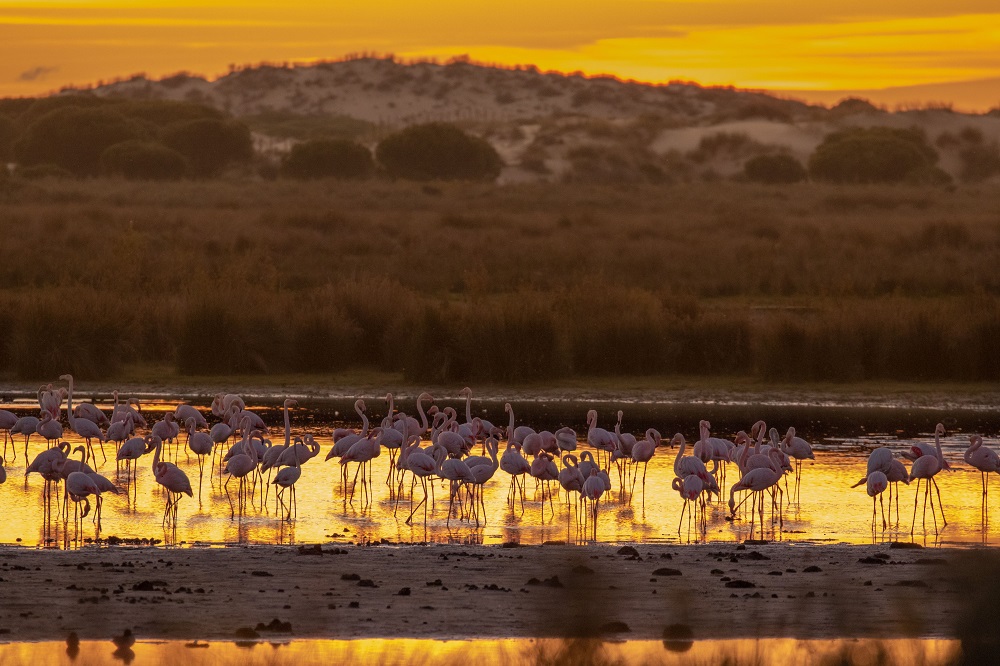Scientists from the University of Leeds and the Spanish National Research Council say urgent protection is needed for the fragile Doñana wetlands in Andalusia as the result of the bill which sanctions illegal strawberry production in its immediate vicinity. The bill, which was approved by the regional government without any parliamentary debate, allows intensive irrigated strawberry farming on land originally devoted to forestry or rain-fed agriculture. 80% of the strawberries grown in the region are exported, with the UK and Germany receiving half of these exports.
Scientists Luis Santamaría from the Doñana Biological Station in Spain, and Julia Martin-Ortega from the University of Leeds' Sustainability Research Institute, have raised their concerns in a paper published today in the Nature Water journal. Both researchers work in the EU-funded project Waterlands, bringing together 32 organizations in 14 European countries.
Doñana is one of the largest wetlands in Europe and hosts up to half a million migratory waterbirds and maintain a rich biodiversity, including over 50 species of waterbirds and two of the most endangered species in the world: the Iberian lynx and the Spanish imperian eagle. However, the intensive development of its surroundings has caused the degradation of the vegetation and soils, the drastic reduction of its temporary ponds, critical declining in the number of waterbirds and the near disappearance of the rabbit, the main pray of the lynx and the imperial eagle.
"Although Doñana still has outstanding biodiversity that justifies its conservation, it has been subject to relentless degradation over decades, which is reaching a point of-no-return", said Luis Santamaría. "Instead of taking the decisive actions required to save it, the current Bill marks the return of outdated, unsustainable policies that will accelerate its end."
This new law, they warn in the article, has originated an unprecedented confrontation of the regional Andalusian government with the European Comission, who has already threatened Spain with new sanctions. Spain was already sanctioned by the European Court of Justice in 2021 precisely for failing to control illegal groundwater extraction that depletes Doñana's aquifer. In the last weeks, major European strawberry retailers have already voiced concerns about the environmental impact of their Spanish imports.
Spain was recently threatened with sanctions as a result of the Bill, in what was an unprecedented confrontation of the regional Andalusian government with the European Commission. The Bill also poses a reputational and economic risk, with major European retailers having already voiced concerns about the environmental impact of their Spanish imports. 80% of strawberries produced in the region are destined to exportation with Germany, France and United Kingdom receiving over two thirds of these exportations.
"This Bill may compromise the past endeavours by legal strawberry producers who have made an effort to reduce water consumption and agro-chemical use in the area. In fact, a campaign is already underway by the German pressure group Campact, calling on retailers to stop selling so called "dry strawberries", said Professor Julia Martin-Ortega. "We can only hope that reactions against this Bill will trigger new conservation policy. It is extremely important that any decision moving forward is taken on the basis of scientific evidence, which in this case is unequivocal: Doñana's ecosystem is in danger."
Doñana is one of the ‘Knowledge Sites' within the ambitious EU-funded project WaterLANDS which aims to restore wetland sites throughout Europe and lay the foundations for protection across wider areas. Dr Shane Mc Guinness, of University College Dublin and Project Coordinator of WaterLANDS, said: "Because of their support for biodiversity, water, carbon and culture, wetlands are extremely important to humans and nature alike. "Properly valuing these areas is therefore more important than ever and their long-term protection should always be prioritised over short-term economic gain."
Luis Santamaría y Julia Martin-Ortega. How Europe's most iconic wetland could be finished off by a strawberry farming bill. Nature Water. DOI: 10.1038/s44221-023-00100-w
Contact:
outreach@ebd.csic.es
www.nature.com/articles/s44221-023-00100-w








 Las altas temperaturas están provocando que las lagunas y las marismas de Doñana pierdan agua rápidamente
Las altas temperaturas están provocando que las lagunas y las marismas de Doñana pierdan agua rápidamente



